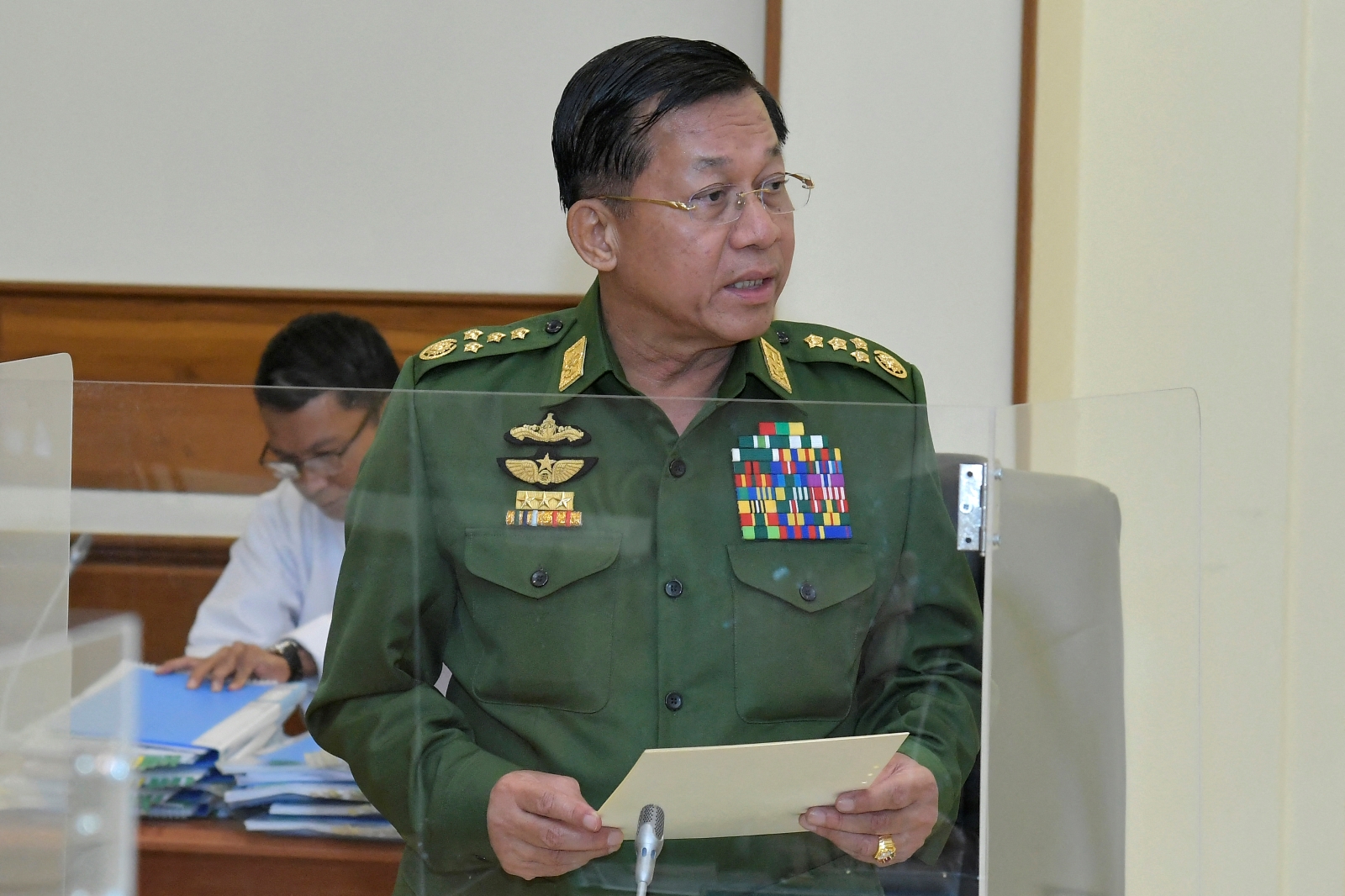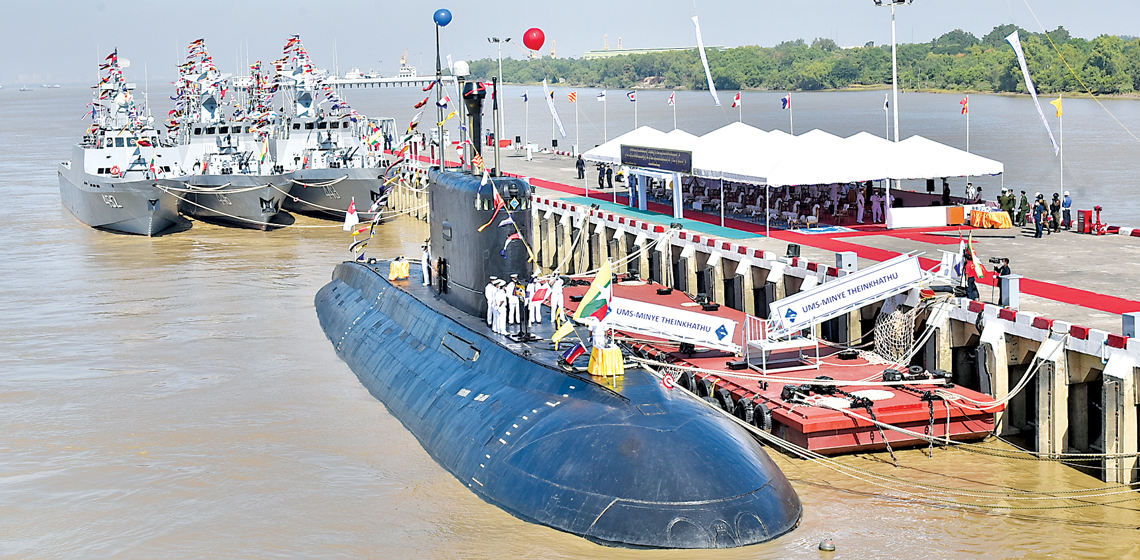The military regime’s rationing of fuel consumption to lower Myanmar’s import bill has fuelled illegal sales, while hoarding by businesses and profiteering by speculators have hiked the price of petrol and other goods.
By FRONTIER
On March 9, at a regime meeting to discuss budget estimates for the 2023-24 fiscal year, deputy junta leader Vice Senior General Soe Win said the high cost of imported fuel made it necessary to reduce consumption in order to conserve foreign exchange.
To address the situation, he said the junta would be exercising greater scrutiny over fuel consumption during this fiscal year, which began on April 1.
“The fact that we cannot buy as much as we need and are having to trade on the black market happened after [Soe Win] said consumption would be reviewed and closely scrutinised. Perhaps there were other factors apart from what he said, but that is what happened,” Ko Kyaw Naing said at the petrol station he owns in Mandalay city.
After Soe Win’s speech, the Myanmar Petroleum Trade Association issued a statement on March 10 that announced it would be forming teams to monitor consumption and inspect retailers, who will be warned, blacklisted or have their businesses temporarily closed if they are found flouting regulations.
Junta chief Senior General Min Aung Hlaing has said the country is importing US$2 billion worth of fuel every year and, when power shortages are becoming increasingly frequent, greater use should be made of electric vehicles in the transport sector to reduce foreign exchange spending.
Most of the fuel used in Myanmar is imported from Singapore. According to data compiled by the former National League for Democracy government, as of 2019 there were more than 2,600 licensed petrol stations throughout the country.
Since May last year, licensed petrol stations have been issued with quotas for buying fuel, and strict checks apply to purchases by other users, including in the industrial and agricultural sectors. The quota was reduced in March and the checks on retailers have been tightened, said industry sources.
Ko Thet Maung, who owns a petrol station in Pakokku, in Magway Region, said his weekly quota for each grade of fuel was reduced in March by 10 barrels, or about 2,200 litres. “Now, my weekly quota is 14,000 litres for 92 RON and 5,000 litres for diesel,” he told Frontier on March 28.
“In areas where there are many workplaces that need to use fuel, something like a black market automatically appeared when buyers were prepared to pay more than the official rate because they urgently needed fuel,” Thet Maung said.
The black market exists because demand far exceeds supply among those who rely on fuel to run their businesses and are prepared to pay more than the official price. Shortages have also contributed to hoarding by profiteers, which has further affected supply.
“We are buying as much fuel as we can get in the market. At licensed petrol stations we negotiate with the manager and can buy by offering K200 or K300 a litre more than the official price. We can get a profit if we sell it instantly to those who urgently need to buy,” explained a fuel speculator in Mandalay who asked not to be identified.
Another Mandalay resident who makes a living speculating on fuel said he had borrowed a friend’s business licence to be able to buy. “I resell the fuel at a profit, but I cannot buy as much as I want; I have to buy it little by little,” the man, who did not want to be named, said.
Some drivers supply the black market by buying more fuel than they need at petrol stations and reselling the surplus.
Ko Aung Zaw Moe, who owns a petrol station in Nay Pyi Taw, said closer checks were needed to prevent this. He told Frontier that while most petrol stations he knew of were not selling beyond their quotas, “some [customers] want too much; they want to buy up to K700,000 or K800,000 worth of fuel. It makes us suspicious.”
However, Ko Soe Min Htet, who makes a living driving a 12-wheeled truck between Yangon and Mandalay, said that since mid-March trucks have been limited to buying up to K100,000 ($US47 at the artificially high Central Bank rate, or $35 at the market rate) of fuel any time they go to a petrol station.
“Truck drivers cannot buy as much as they need,” he told Frontier.
‘Like looking for oxygen during the COVID-19 pandemic’
The shortages, and the need for fuel-hungry businesses to pay above the odds for fuel on the black market, are also raising prices for commodities such as paddy and other crops, thereby increasing the cost of living for everyone in Myanmar.
U Myint Wai lives in Ayeyarwady Region’s Maubin Township and makes a living using his paddy-harvesting and threshing machine. He said that he was buying diesel for agricultural purposes from retailers and paying K580,000 a barrel, the equivalent of 220 litres. Before March, he was paying K520,000 a barrel, he said.
In late March the retail price of fuel for the general public in Maubin was K2,180 a litre but for farm and business purposes the price was about K2,600 a litre.
“Even when paying high prices, we can’t get as much fuel as we need. We have to go around and buy at one outlet after another,” Myint Wai explained, also describing other hurdles. “When buying fuel for agriculture, we need a letter of recommendation from a ward or village tract administrator. Without it, we can’t buy fuel.”
Higher fuel prices and the use of machines such as that owned by Myint Wai saw the cost of harvesting the latest summer paddy crop rise to K90,000 an acre, up from K80,000 last season.
The situation has spurred the creation of a Facebook group to monitor the market and help consumers find and buy fuel. The fuel market watchers’ group boasts more than 160,000 members. A member of the group posted on March 31: “In Yangon, many people have become fuel brokers. Petrol stations have no fuel to sell, but motorists are being offered fuel to buy by brokers.”
On April 2, another member of the group posted: “Please help me. Where can I get fuel in Yangon? … No petrol station or fuel shop will sell to me. It’s like looking for oxygen during the COVID-19 pandemic.”
MPTA secretary Dr Win Myint acknowledged on March 23 that the market is facing challenges, despite what he described as careful scrutiny by the association to ensure that fuel is being supplied to those who need it the most.
“We always keep one month’s reserve of fuel. It is our policy. We have enough fuel but we only sell after careful scrutiny. Some are reselling the fuel we sell them, and this hurts consumers. Consumers are also buying more than they need because they worry that they may not be able to buy freely [in future]. That is the difficulty we face,” Win Myint told Frontier.
He said that starting from March 23, the MPTA is selling to workplaces in industrial zones that can demonstrate a need to buy fuel and have the support of the nation’s peak business body, the Union of Myanmar Federation of Chambers of Commerce and Industry.
Win Myint said the regime had not directed the MPTA to reduce fuel imports for the 2023-24 fiscal year. “The meaning of what Vice Senior General Soe Win said was broad and I don’t want to comment on it,” Win Myint said, adding that Myanmar is importing between 360,000 tonnes and 530,000 tonnes of fuel every month.







